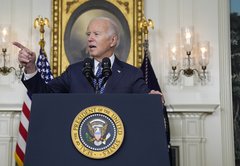Make HBCUs, TCUs, and under-resourced MSIs more affordable for their students
Joe Biden
"Make HBCUs, TCUs, and under-resourced MSIs more affordable for their students. The Biden plan will invest $18 billion in grants to these four-year schools, equivalent to up to two years of tuition per low-income and middle class student, including DREAMers and students who transfer to a four-year HBCU, TCU, or MSI from a tuition-free community college."
Biden Promise Tracker

Compromise



